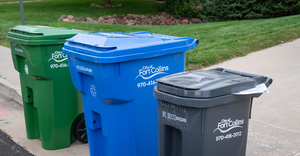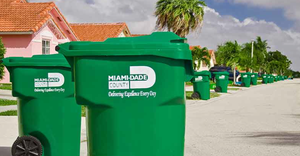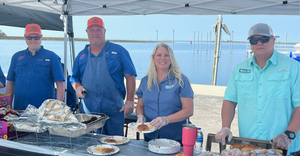DutchX and DeliverZero Set Sail to Prove Out Sustainable Food Delivery
Logistics is a tough business, especially for companies trying to make a go in this niche with sustainability in mind. Nobody is more aware of this reality than zero emission delivery operator DutchX and reusable container supplier DeliverZero. The two companies have partnered to integrate sustainable logistics into the food industry.

Logistics is a tough business, especially for companies trying to make a go in this niche with sustainability in mind. Nobody is more aware of this reality than zero emission delivery operator DutchX and reusable container supplier DeliverZero. The two companies have partnered to integrate sustainable logistics into the food industry.
DutchX operates over 250 e-bikes, e-vans, and box trucks and has three micro hubs located through New York City for sorting inventory and charging vehicles. This system enables the company to remove over 2.3 million metric tons of CO2 emissions annually. Its clients are large e-commerce companies, Amazon, Whole Foods, restaurants, as well as fashion companies and other non-food brands.
New York City has turned out to be a good hot spot for business.
“The city has a lot of density, so it’s a great area to prove the concept of e-bike delivery. It’s a complex city, and if we can do it here, we can do it anywhere,” says Drew Keslowitz, vice president of Operations and Growth for DutchX.
While density can present challenges, the company has managed to use it to its advantage in the Big Apple.
“New York is one of the most populated cities in our country, and it means more people want groceries and takeout. More orders equal denser routes, which reduces the number of touch points, stops, and delivery length,” Keslowitz says.
A thriving market, combined with heavy investment in infrastructure, has enabled DutchX to offer rates competitive with FedEx and other large, regional carriers.
The company sees a bright future. e-cargo fleets have come a long way overtime. Advances in battery technology have extended the range and efficiency of e-bikes, allowing them to cover more ground with fewer charges. Enhanced carrying capacity has enabled these bikes to transport larger, heavier loads—comparable to traditional delivery vehicles, according to Keslowitz.
Seeing the benefits of sustainable logistics in a large metropolis, New York has become vested in this alternative transportation mode. The New York City Department of Transportation recently published a new regulation around e-cargo bikes and has added bike lanes.
And the city is sponsoring a micro hub pilot with parking lots and unloading spaces to ease congestion from delivery vehicles.
“We are excited about this pilot. Micro hubs create a safer environment that is better for the community and for our workers. And [more micro hubs] will help us increase our footprint into other boroughs,” Keslowitz says.
Also in the works is the Blue Highway initiative to facilitate the use of ferry systems to transport parcels. This will enable companies like DutchX to pick up products from clients or their own facilities, sort, containerize, and load them on ferries, then have bikers pick them up from Manhattan piers.
A delivery management system helps with routing, integrates order management, provides live tracking of packages and orders, and performs analytics and reporting of sustainability metrics.
Key to success has been building out a diverse portfolio—reverse logistics, sortation, and a service where companies can move products and packaging between their stores or direct to their customers, among offerings.
As diverse is the equipment inventory. Each bike, with 60- to 100-cubic square feet of capacity, and able to carry 300 to 700 pounds, serves specific purposes. One may be best suited for a food company and another may be better for a fashion brand. One may be a good fit for Brooklyn and another for Manhattan.
DeliverZero works with restaurants, coffee shops, and other food service providers, facilitating the return of reusable packaging to help tackle the problems of single-use food ware. And the problems are enormous.
In 2023, New York City spent $4.5 million to collect and dispose single-use plastic plates, cups, and cutlery. That’s only the residential material— half of what New York City generates in total, according to Elizabeth Balkan, director of Reloop North America. Reloop works with governments and industry to accelerate the global transition to a circular economy.
Through its new account with DeliverZero, DutchX will pick up the company’s used containers, drop them off at their cleaning location, and leave off new containers.
“Logistics is challenging, but DutchX navigates those challenges well, and partnering with them allows us to spend our time focused on scaling reusable packaging. Each partner gets to focus on what we’re good at,” Sweeney says.
Zero-emissions and zero-waste deliveries will be the norm in the future, she projects.
“Through our partnership with DutchX we are able to make it possible right now. We’re proving a model for how things can and should be done.”
DutchX has seen an uptick in takeout and food delivery services since the pandemic, driving more business within this sector and the emergence of new service types. For instance, employers are offering takeout programs for their employees where they can order from multiple restaurants. And software companies are facilitating this carry out model.
“So, we see carry out going up both for families and companies, as well as advancements in technology to make ordering easy,” Keslowitz says.
Food must be handled with more sensitivity than some other products.
“We tell employees, pretend like you are delivering to your family. You do not want to deliver squished breads or bruised bananas, so make sure to get it to customers in the condition they want it in,” Keslowitz says.
Perishable foods are transported in refrigerated trucks with technology that tracks temperatures in real time, and DutchX will soon test refrigeration in its e-bikes.
Keslowitz estimates that 80 to 90 percent of companies he and his team talk to have strict sustainability goals. They are looking across all of their operations to help reach their targets, and that includes zeroing in on logistics.
Still, some companies are just looking to deliver a quality product at the lowest possible cost.
Says Keslowitz: “For that minority, the environment might not be their priority today—maybe tomorrow. For now, we try and come up with a game plan that works for everyone and for the environment, which means putting infrastructure in place to operate cost effectively, quickly, and sustainably.”
About the Author
You May Also Like




